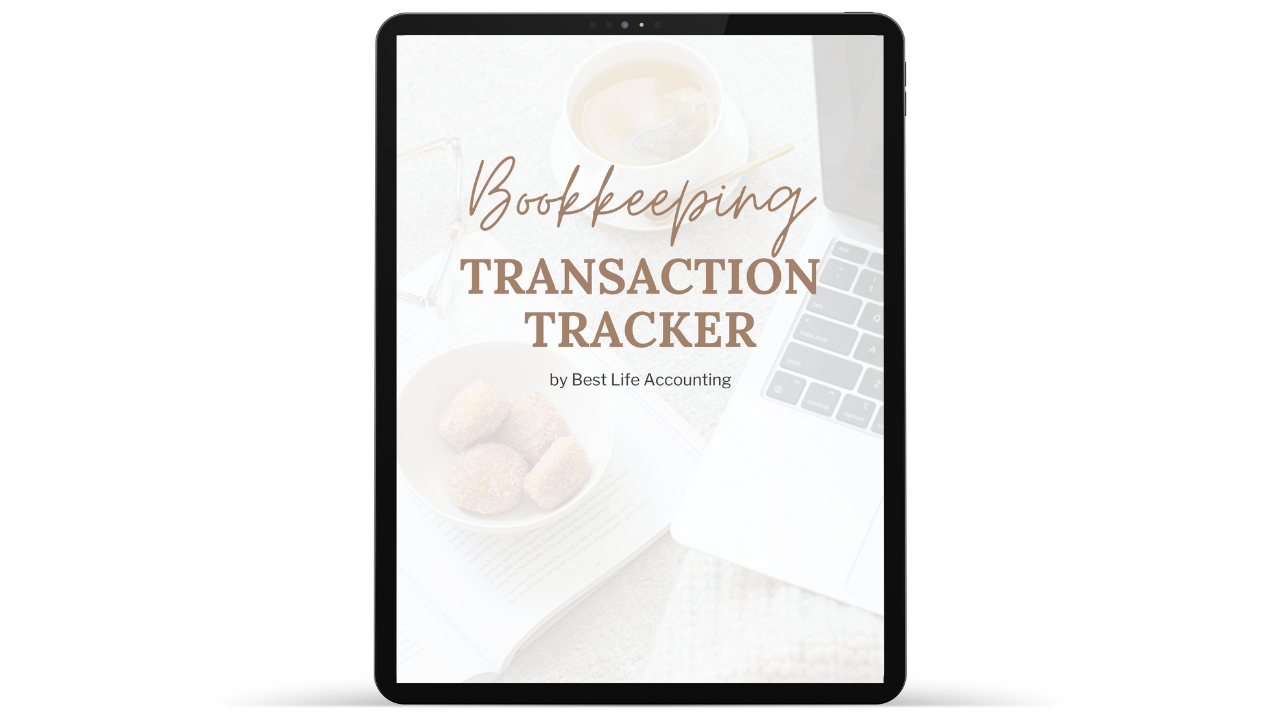1099s & W9s

This post may contain affiliate links, which means I’ll receive a commission if you purchase through my link, at no extra cost to you. Please read the full disclosure here.
1099s create a lot of confusion for small business owners! There are multiple different types of 1099s, you can issue and/or receive 1099s, and there are tons of nuances. Keep reading to learn what you need to know about 1099s as a small business owner.
What is a 1099?
A Form 1099 is an informational tax form used to ensure there is a paper trail for payments made by businesses where the payments are not made via a credit card payment processor. 1099s are submitted by the payor to the payee and the IRS. It’s similar to a W-2 that an employee would receive from their employer, but the 1099 is for vendors (or contractors) of small businesses.
There are 3 main types of Form 1099s that are relevant to small business owners which will be discussed in this blog post.
- 1099-NEC - issued by a business to independent contractors for services provided
- 1099-MISC - issued by a business to landlords for rents paid
- 1099-K - issued by financial & tech companies (like Stripe or Shopify) to businesses who processed payments through their payment processors
When we discuss 1099s in this blog post, we’ll be looking at it through the lens of your small business issuing a 1099 to your contractors or your landlord.
Most business owners reading this post will not be issuing 1099-Ks but might be receiving them from their payment processor. (If you are issuing 1099-Ks, this blog post is not for you, and you should ask your accountant about issuing 1099-Ks)
For the purposes of this blog post, I will refer to Form 1099-NEC and 1099-MISC as “1099” and 1099-K as “1099-K”.
Remember: if you are reading this as a small business owner, you may issue 1099s, but you will not issue 1099-Ks (you might receive them but will not issue them).
Why are 1099s required?
Payments between small businesses and contractors often may not be reported to the IRS. The 1099 is how the IRS confirms that if a business takes a deduction for certain payments to individuals or other small businesses, the payments to the payee are being reported on the payee’s taxes.
Similar to a W-2 for employees, the business issues a 1099 to a required recipient and the IRS. Then, the required recipient claims that income on their taxes using the 1099 as documentation. Then, the IRS cross references those documents to confirm that the income was reported by the recipient.
Issuing 1099s
A 1099 should be issued to a person or business, if your business paid them $600 or more in the calendar year, and you paid via one of the payment methods requiring a 1099, and they are not incorporated or filing taxes as an S-Corp.
Shew, that sentence makes me need a glass of wine. Let’s break it down, shall we?
1. “to a person or business” –
This includes contractors or vendors that provide services to your business and landlords that your business pays rent to.
Note: you do not need to issue a 1099 for physical goods purchased, only for services provided.
2. “$600 or more in the calendar year” –
This one is pretty self-explanatory - $600 is the threshold to remember.
3. “paid via one of the payment methods requiring a 1099” –
Payment methods that would require a 1099 are: cash, check, ACH, wire, Zelle, PayPal Personal, PayPal Business Family & Friends, CashApp, or Venmo Personal.
Payment methods that would NOT require a 1099 are: credit card, debit card, PayPal Business Goods & Services.
4. “not incorporated or filing taxes as an S-Corp” –
You will find out if your vendor is incorporated or taxed as an S-Corp via the W-9. The W-9 is discussed later in this post but it’s essentially the form your vendor fills out to give you their tax information for the 1099. Once they complete the W-9, you will be able to see if they meet this requirement or not.
Note: if you paid a lawyer, it doesn’t matter how their business is structured or taxed. If you paid a lawyer and the other requirements apply, you must issue a 1099.
1099-NEC vs. 1099-MISC
There are two main types of 1099’s that most small businesses issue. A 1099-NEC and 1099-MISC. A 1099-NEC (NEC stands for Non-Employee Compensation) is issued to contractors for services provided. A 1099-MISC is issued to landlords for rents paid.
Rents paid would be for office rent, not your personal rental if you have a home office. Only if you explicitly pay a landlord to rent a space for your business and run that rent through your business.
All of the rules listed above apply to both 1099-NEC and 1099-MISC. They are just two separate forms for two separate payees in your business – contractors and landlords.
Recap of 1099 requirements
To recap: You should issue a 1099 if all of the following apply:
- Vendor providing services in your business or landlord to whom your business paid rent
- Paid $600 or more in the calendar year
- Paid via cash, check, ACH, wire, Zelle, PayPal Family & Friends, CashApp, or Venmo Personal
- Vendor is not incorporated or filing taxes as an S-Corp (per the W-9) (if paying a lawyer, this requirement does not apply - only the first three requirements)
How can I avoid this reporting requirement?
You don’t have to issue a 1099 if you paid the vendor via credit card or PayPal Goods & Services. In this case, the credit card payment processor will issue a 1099-K.
Remember the mention of 1099-K in the first section? Here’s where those come into play. If you pay a contractor via a credit card using their invoicing system (like if they invoice you via Dubsado or Honeybook), you do not have to issue a 1099 because those payments qualify for a 1099-K.
You should not issue a 1099 for payments you’ve paid for via credit card or PayPal Goods & Services “just in case”. That would essentially cause the recipient’s income to be double counted.
Note that paying through PayPal Goods & Services (which includes a fee) means you don’t have to file a 1099. However, if you pay through PayPal Friends & Family (no fee), you do have to file a 1099.
When are 1099s due?
1099s are due January 31st for the previous calendar year. So, 2024 1099s will be due on January 31, 2025.
How to file 1099s?
I use Track1099.com for my clients. You can use this to electronically request W-9s & file 1099s. It’s the best program and one of the least expensive options out there.
However, the best way to file 1099s is to hire a bookkeeper to file them for you. I provide my clients with 5 free 1099s each year at no extra charge (most don’t exceed this limit). I also monitor for 1099 recipients at no extra charge. As you can see from the above, there is a lot of information, rules, and nuances to 1099s. Hiring a professional to handle this for you is the best decision for most business owners!
If you use a payroll processor like Gusto or ADP and pay your contractors through that system, then the payroll processor will file 1099s for those contractors (just like they also file the W-2s that go out to your employees).
What if I don’t file 1099s?
If you are subjected to an IRS audit, the IRS could disallow your deduction if a 1099 was required but not filed. Also, you can be penalized for not filing the forms.
What is a W-9?
A W-9 is a form you request from the vendor in order to file the 1099. The W-9 collects tax information from the vendor so that you can properly file the 1099. You can download a W-9 from the IRS here. If you use Track1099.com, you can use their W-9 feature to electronically request this form from your vendors.
I recommend requesting and receiving a W-9 from vendors before they start work so that you don’t have to chase them down at the end of the year to get this information.
A W-9 is to a 1099 what the W-4 is to a W-2. Just like when you start a new job as a full-time employee and have to fill out the W-4 on your first day, it’s standard operating procedure to request a completed W-9 form from a new contractor before they start work.
If you are paying a vendor via a credit card processor or PayPal Goods & Services, you do not need to collect a W-9 as they will not need a 1099 at year-end.
Conclusion
Wow! That post was a doozy. I don't know about you but I need a brain break after writing that one 😅 I'm sure you feel the same way from reading it 😆
The TL;DR here is that 1099s are confusing as hell and there are way too many convoluted rules surrounding them. One of the best ways to just avoid this headache altogether is to hire a bookkeeper.
When you hire me for monthly bookkeeping services, I am the one who looks at your list of vendors, looks at how you paid them, looks at what you paid them for, requests the W-9s from eligible vendors, and files the 1099s on your behalf.
It is completely taken off your plate and placed in the hands of a competent professional. If you've read through this entire blog post, I know that you care about doing the right thing in your business and staying in good graces with the IRS. Hiring a bookkeeper like me ensures that this technical stuff gets done and done right.
So, grab yourself a glass of wine, peruse the services page, fill out the inquiry form, and relax knowing that your bookkeeping will be in good hands soon!
If you are DIYing your books, check out my program, Clear Profits. Clear Profits is a DIY bookkeeping course + digital product bundle for the business owner who isn't ready to hire a bookkeeper yet.
Inside the program, I discuss 1099s & W-9s in more depth + tons of other topics that you need to know when doing your own books. If you're going to do your own books, ensure you are informed. Apply today!









